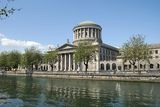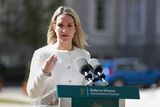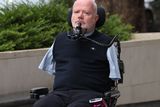‘AI must support and never replace teachers’ – union calls for regulation of AI in Irish classrooms
Stock image. Getty Images
TEACHERS were warned that Irish classrooms are now dealing with the dawn of the Artificial Intelligence (AI) age as a leading trade union voted to require the Government, under future social partnership agreements, to include a special clause governing the use of AI.
Teachers Union of Ireland (TUI) members warned that AI should never replace human beings in the classroom and must only be used to support and not undermine teachers.
For the first time ever, AI and the need for its carefully regulated control emerged as a major motion on the TUI annual conference agenda.
TUI delegates overwhelmingly passed a series of motions aimed at implementing safeguards over the use of AI - and to ensure AI can never threaten existing employment.
The motions came as it emerged that AI was already challenging certain classwork with AI-supported programmes writing essays for students and even supplying codework for some projects.
A TUI executive committee motion was joined by four branches from Donegal, Galway, Longford and Offaly in warning of the potential dangers posed by AI to the Irish education sector if its use was unregulated.
The union has now voted to insist that AI and its potential deployment be on the agenda for all future national discussions between the Irish Congress of Trade Unions (ICTU) and the Government.
Donegal TUI member Ursula O'Connor said the challenges were as real as they were far-reaching for educators.
"This is not science fiction," she warned.
"It is the reality in 2024 - we are at the dawn of a new age. This is the age of AI. But along with the endless possibilities we must be alert to the potential pitfalls."
The EU has already acknowledged that, in terms of the general applications of AI, the global education sector has the highest risk.
"Teachers must remain at the core of the education system. AI must support and never replace teachers."
TUI executive committee member Antoinette Rourke warned that AI must always server the greater good in society.
"We have to tread very carefully," she said.
"We need assurances that no worker should be at the will of a machine. AI must align with our values, our ethics and our societal wellbeing."
TUI members warned that such are the far-reaching applications of AI that it has even brought the authenticity of some classwork into doubt.
"Will it be the student's project, Mammy's project or the AI project," one delegate asked?
TUI delegates overwhelmingly backed motions from four county branches which stressed that "human interaction...(must remain) at the heart of quality education."
"AI must not be allowed to substitute for, displace or replace teachers or lecturers."
TUI members stressed that, if necessary, the potential threat of AI be dealt with by means of industrial action either at local or national level.
The union executive acknowledged that AI "has profound and immediate implications involving both risk and opportunity for public education systems, for education sector employees, for learners and for teaching and learning".
It is now planned to create a special working group to analyse and monitor the risks and opportunities offered by AI within the education sector.
Further, the TUI will now develop a strategic approach to the use of AI for schools and colleges following on from a special policy study last year.
It was agreed that the union "demand of all relevant government agencies credible assurances and commensurate practical measures to insist that the use of AI in the public education sphere will be the subject of social dialogue and, where appropriate, collective agreements".
Earlier, TU general secretary Michael Gillespie warned that urgent action must be taken to ease the teacher recruitment and retention crisis within the education sector - and ease the workload on over-stressed teachers.
He also revealed at the opening of the TUI's annual conference in Killarney that discussions are ongoing with the Association of Secondary Teachers in Ireland (ASTI) over the creation of a powerful new union.
"The TUI, as you are aware, made this offer in the context of the formation of a new amalgamated union. This offer has led to the ongoing discussions with the ASTI in relation to amalgamation and unity," he said.
"As outlined last year, the initiative taken by the TUI was to give impetus to the talks on amalgamation, a long-standing TUI policy.
"Amalgamating the TUI and ASTI is the right thing to do. It is worth the generosity; it is worth the effort for the prize of a bigger, stronger union with a bigger voice which will have more power and say.
"We will work hard to achieve this long held TUI ambition. The President will update Congress later in terms of the next steps in the process. Personally, having taught in a dual union school, I have believed in this for all my teaching and trade union career."
He stressed that the immediate crisis facing the sector was recruitment and the loss of skilled teaching graduates to overseas posts.
Mr Gillespie stressed that unions had issued stark warnings years ago about a looming recruitment and retention crisis.
"TUI had warned over several years that there were severe recruitment and retention issues building in the system," he said.
"The TUI has made suggestions over the years as to how to alleviate this problem. The reduction in the Professional Masters in Education (PME) from two years to one year would have an immediate impact as would a circular letter on incremental credit for post primary teachers to help bring our teachers home from serving abroad.
"The payment of allowances for SEN qualification, Teaching through Irish and Island allowances may also help in the recruitment and retention of teachers in these areas which were abolished by the Government in 2012.
"The various training and re-training initiatives are welcome as they help provide additional teachers where qualified teachers are scarce."
He also warned that Ireland had to mirror the intensive recruiting strategies adopted by other countries to attract highly skilled teachers.
Join the Irish Independent WhatsApp channel
Stay up to date with all the latest news















